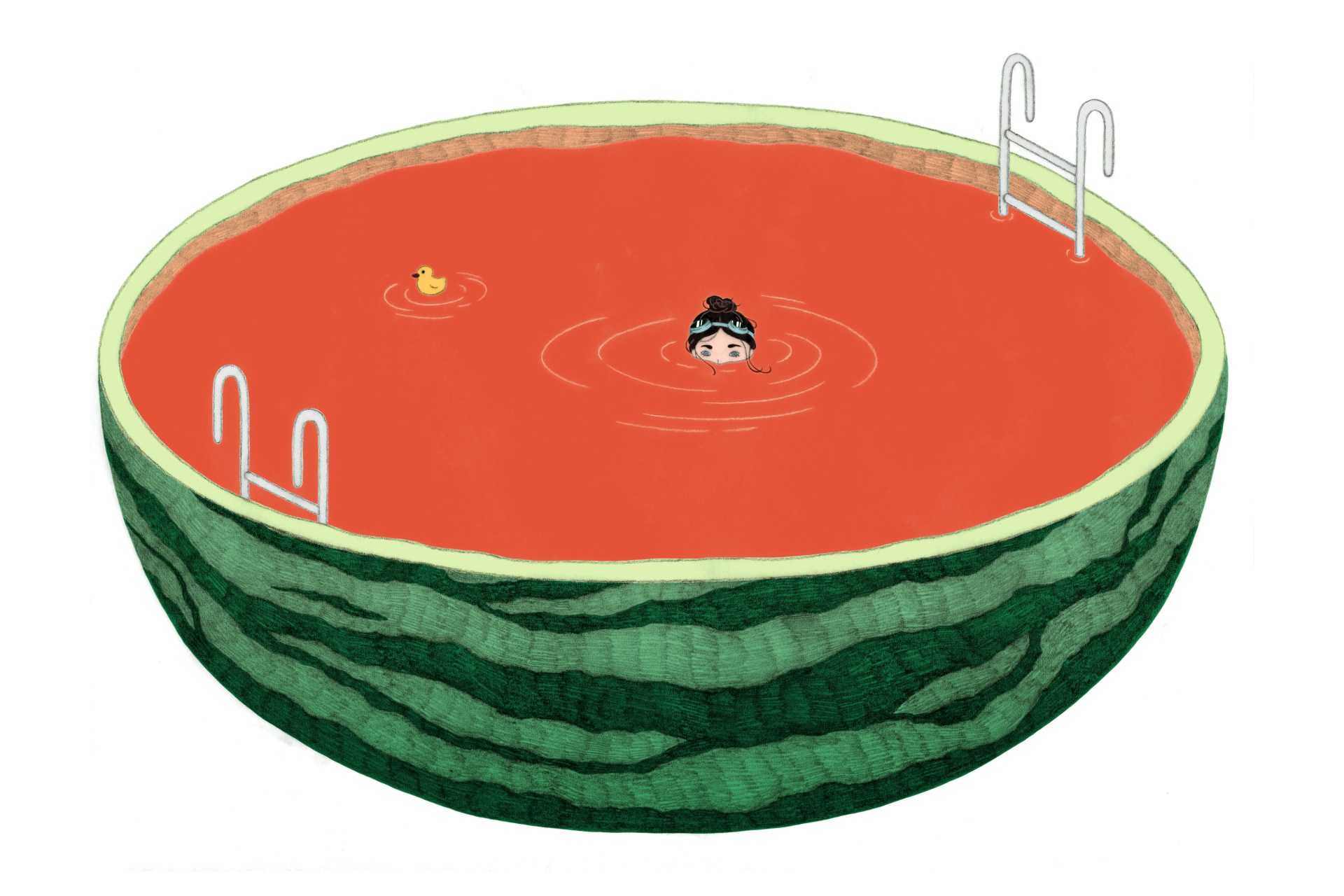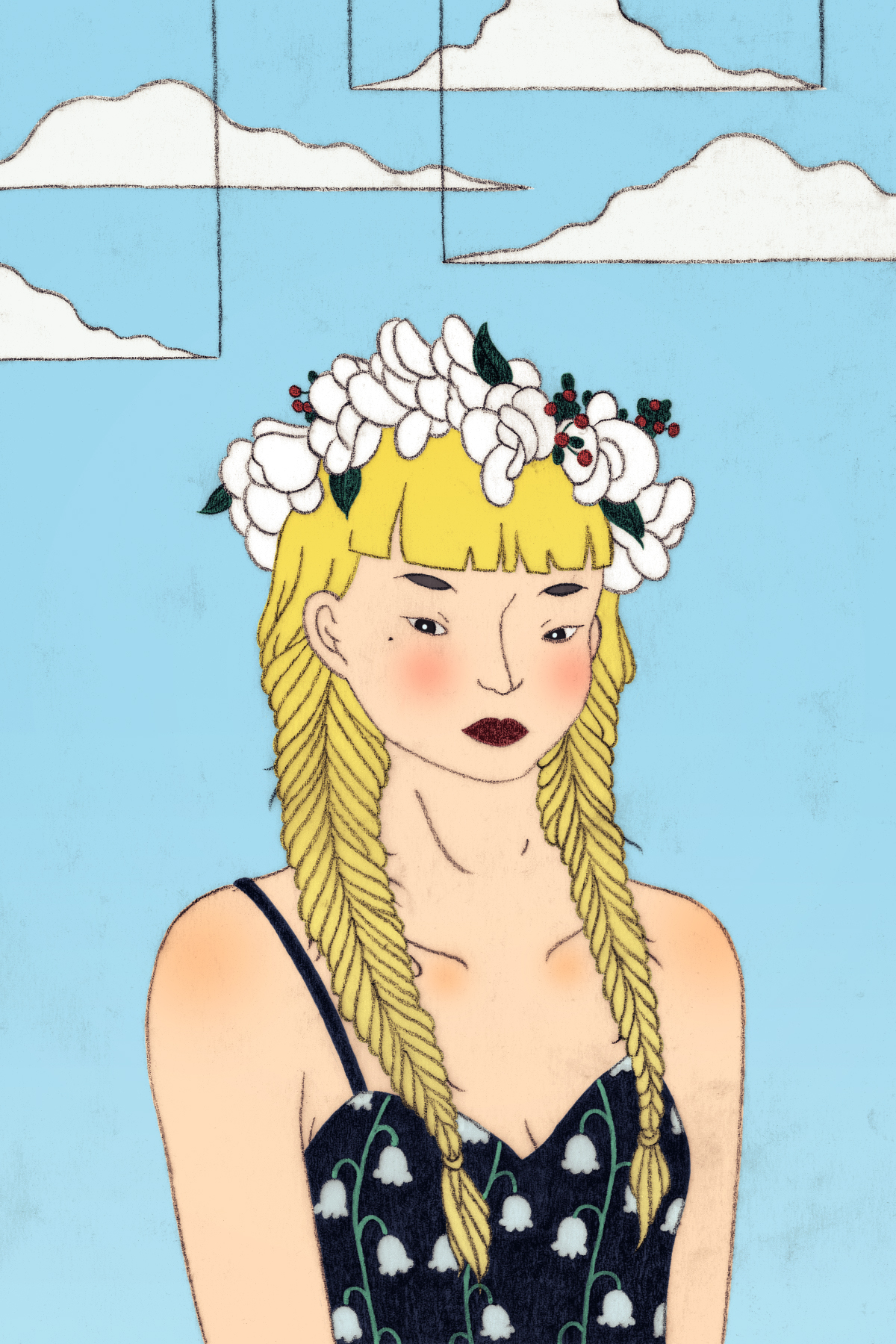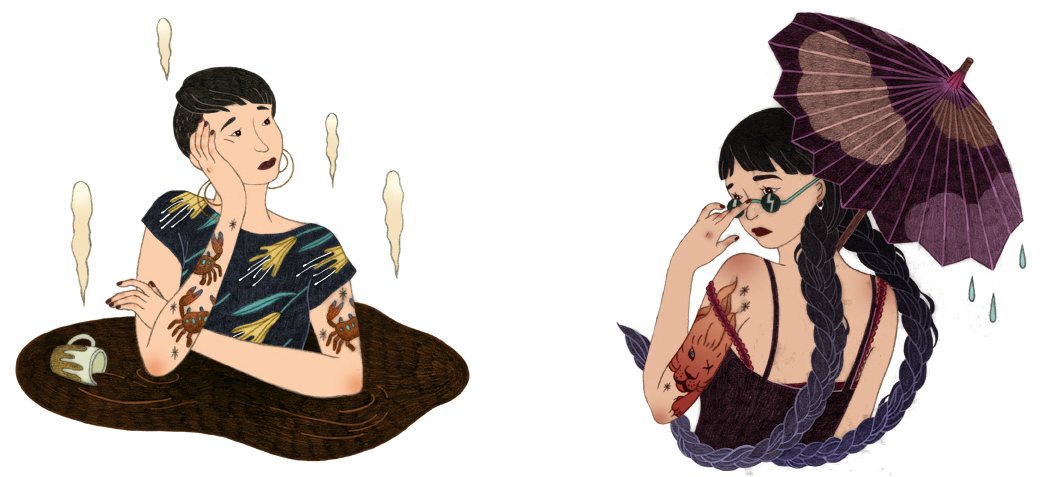When we saw Jo Yeh‘s work in Paper Darts, we knew we had to have her. Her artwork is stunning, the imagery fresh and a spin away from collage as the unexpected is linked and bound to produce bright, undeniable beauty. The women in her work are living their lives and happen to be captured in motion, whether swimming (or sinking?) in a pool of watermelon or tugging down sunglasses with a single finger.
Each piece is a thought in itself, the sort of thing you’d make your cover photo or text to your best friends not just to seem cool and edgy, but to share an emotion you didn’t know how to verbalize. There’s a distinct feeling of existing, and refusing to dial back. We were so excited to have the opportunity to work with Jo Yeh, and we welcome you to Jo’s world.

LUCIA PASQUALE: Your work is such an enticing and stylish depiction of modern life. Can you talk a bit about your art and it’s relationship to the digital age?
JO YEH: I insisted on not using a smartphone until my mom gave me one in 2012, because I knew I was going to get attached. Then after that I just didn’t know how to live without it. It’s a very direct and straightforward reaction for me to draw things/objects from daily life. That is where most of my inspirations come from. So it’s not surprising at all that I draw stuff like online dating, hard drives, Google Maps and etc.
I think [digital communication] is a very universal experience, so it’d be a natural connection between my work and the audiences.

…by being sensitive and vulnerable, it also sends out a positive message that each woman is an independent individual who is capable of feeling, thinking, and expressing, to act, to accomplish, and just to be.
LUCIA PASQUALE: Your art contains many images that take on a surrealist quality, often portraying women in dream-like settings where their inner thoughts appear to be blending with their exterior lives. What role does womanhood play in your work?
JO YEH: It’s very natural for me to draw women since I am one… *laughs*. In general, I like drawing women because there are more curves on female bodies.
Conceptually, although this may sound stereotyped, I think the female figure brings out the idea of sensibility and vulnerability more easily, which are the two most important qualities of my work.
However, by being sensitive and vulnerable, it also sends out a positive message that each woman is an independent individual who is capable of feeling, thinking, and expressing, to act, to accomplish, and just to be.
LUCIA PASQUALE: Where do you draw inspiration from?
JO YEH: As I mentioned, most of my inspirations come from my daily life. My work is always sort of related to the environment or mood I am in. I was studying in Minneapolis, Minnesota for the past two years. Once a friend of mine from Taiwan told me my work from that time period always looked cold, although I didn’t intend to make it that way. Sometimes it’s a subconscious process.

I was studying in Minneapolis, Minnesota for the past two years. Once a friend of mine from Taiwan told me my work from that time period always looked cold…
LUCIA PASQUALE: What artists have influenced you?
JO YEH: I’ve admired Yoshitomo Nara’s work since I was a teenager. I watched his documentary and went to a talk he once gave in Taiwan. I think his philosophy and attitudes towards art was something that really inspired and made me determined to be an artist.
LUCIA PASQUALE: How do you feel online platforms such as Instagram, behance, as well as publications have worked to alter the way we consume visual art?
JO YEH: Instagram surely made some significant changes… I noticed that there’s a new group of artists are called “Instagram artists” and that definitely didn’t exist before Instagram became a thing.
In the digital age now, online platforms are not just platforms, they can serve as a medium as well. It also can be more performative, and especially more beneficial for artists who make video and performance work.
But in general these online platforms/publications are helping both sides for sure, those who want to see and who want to be seen.

However sometimes I do have this feeling that the fast development of digital media has made people care less, because the access is so easy and there’s so much of it.
LUCIA PASQUALE: In what ways have the development of digital media been positive/negative?
JO YEH: As I said, I feel digital media create more possibilities for artists not only to engage with more audiences but also to explore new ways to make art. I think this is an inspiring process for all. However sometimes I do have this feeling that the fast development of digital media has made people care less, because the access is so easy and there’s so much of it.
LUCIA PASQUALE: What upcoming projects do you have lined up and where can we expect to see your art go next?
JO YEH: I just finished a two-page comic with some friends for Campfire Press’s first issue, which is created based on a true story. This risograph-printed zine will be out this summer, and I really look forward to that!

I feel digital media create more possibilities for artists not only to engage with more audiences but also to explore new ways to make art. I think this is an inspiring process for all.
ABOUT JO YEH
Jo Yeh is an illustrator originally from Taiwan. She graduated from Minneapolis College of Art and Design and moved to New York City in 2015. She spends most of her time drawing in front of the desk and writing on the subway.

As an artist living and working internationally, she is constantly inspired by the transition of time, environment, and her relationship with people.
Join Jo on Tumblr + Instagram + check out Jo’s website.
Introduction by editor-in-chief.